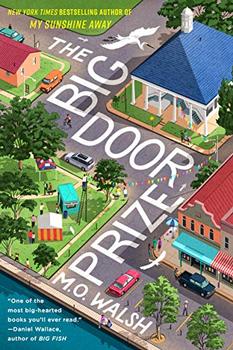Summary | Excerpt | Reviews | Beyond the Book | Readalikes | Genres & Themes | Author Bio

1
The Hubbards
After thirty-nine years and eleven-plus months, Douglas Hubbard had finally had enough of being Douglas Hubbard. So, for his fortieth birthday, just last Friday, he bought himself a trombone. It was a thing he'd long wanted and, now that it was purchased, Douglas felt this object made him an entirely new man. He was so excited, in fact, he spent his entire weekend polishing the instrument until it nearly glowed, standing in front of the full-length mirror in his and his wife's bedroom, spinning aloud out magical phrases like Dizzy Douglas, Herbie Hubbard, and Thelonious Doug. He dreamt up enough jazzy nicknames in the first few days alone to sustain several impressive careers and yet had not even put lip to mouthpiece. Why bother? When a person finds as much joy as Douglas did in simply imagining themselves to be someone else, the actual work required to change, along with so many other things they hold dear, can be forgotten.
But tonight, after clumsily blaring his way through his first trombone lesson at a friend's apartment, Douglas Hubbard returned home to his wife, moved aside the wooden birdhouses she'd been building those past months, and set his trombone case down on the table. "Well," he said. "It's official. I can't play a note."
"Don't be silly," his wife said. Then she began to cry.
This was unusual.
Cherilyn Hubbard was typically warm and upbeat at this hour, which she called their wine time, and Douglas always looked forward to seeing her. Through fifteen years of what they would both call a happy and uncomplicated marriage, she had remained redheaded and faithful, busy and beautiful in her unpretentious way, and as quick to offer love and encouragement to Douglas as she'd been on the days he first fell for her. But, on this night, she stood alone at the far end of their modest kitchen and, instead of greeting Douglas with a hug at the door, wiped at her eyes with the undersides of her wrists. She then leaned heavily against their blue-and-white countertop, which was covered in flipped-open magazines. Beside her, a pot of water boiled quietly on the stove. Near the sink, a box of macaroni and cheese stood unopened. Next to that, Douglas knew, because the day was Wednesday, two hamburger patties sizzled over low, greasy heat in the skillet.
Douglas said nothing. He instead removed the blazer he had draped over his arm and placed it on a chair, hung his keys on a hook screwed into the wall for that purpose. He then took off his hat, a brown woolen beret he'd taken to wearing since he bought the trombone, and arranged the wayward hairs on his balding head. He knew Cherilyn hadn't been feeling well. Some powerful headaches, lately, a dizzy spell or two. He'd been meaning to talk to her about this. The amount of aspirin bottles he'd found about the house, the antihistamine nose spray she'd taken to cupping in her palm those past mornings. The naps she took at odd hours. These are the minor changes to a marital landscape that can worry a thoughtful husband like Douglas. Yet he'd chalked most of it up to stress.
Cherilyn was busy of late in atypical ways. She'd signed up to sell her own handmade birdhouses at the Deerfield Bicentennial that weekend, would have her own booth on the square both Saturday and Sunday, and so had spent the past few months turning their home into a sort of avian sweatshop. There were probably a hundred of the little houses always in eyesight, each in some incomplete phase of construction, with not much time left before the event. That could make anyone nervous. Still, Douglas knew she enjoyed her crafts, had signed up for this booth herself, and so he did not press her.
There were other things it could be, of course, besides bird homes. The oncoming heat of a southern spring. The exhaustion from dealing with her elderly mother, who they both worried was losing her mind. Cherilyn's trips to check up or take her shopping had become daily. She'd therefore quit working her temp jobs around town, cut back on her volunteering, and so maybe that was it, Douglas figured. Maybe she felt her world was shrinking a bit, becoming too predictable, and, as the pre-trombone version of Douglas knew, that could get anyone down.
Excerpted from The Big Door Prize by M. O. Walsh. Copyright © 2020 by M. O. Walsh. All rights reserved. No part of this excerpt may be reproduced or reprinted without permission in writing from the publisher.




Judge a man by his questions rather than by his answers.
Click Here to find out who said this, as well as discovering other famous literary quotes!
Your guide toexceptional books
BookBrowse seeks out and recommends the best in contemporary fiction and nonfiction—books that not only engage and entertain but also deepen our understanding of ourselves and the world around us.